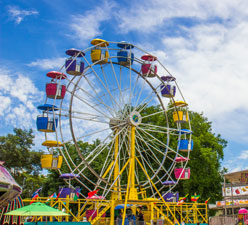Amusement Park, Carnival and Fair Accidents
September 7, 2017 Amusement Parks, carnivals and fairs are extremely popular with families; however, every so often a news story surfaces about large-scale injuries and fatalities that occur at these parks due to negligence. According to the U.S. Consumer Product Safety Commission, close to 31,000 people are rushed to emergency rooms because of amusement park, carnival or fair injuries. In many states, rides are supposed to be checked to ensure that they are constructed in accord with the manufacturer’s specifications. However, accidents still occur and appear to be on the rise.
Amusement Parks, carnivals and fairs are extremely popular with families; however, every so often a news story surfaces about large-scale injuries and fatalities that occur at these parks due to negligence. According to the U.S. Consumer Product Safety Commission, close to 31,000 people are rushed to emergency rooms because of amusement park, carnival or fair injuries. In many states, rides are supposed to be checked to ensure that they are constructed in accord with the manufacturer’s specifications. However, accidents still occur and appear to be on the rise.
Recently in Ohio, a seat detached while a spinning pendulum ride called “The Fire Ball’ was in motion. The accident resulted in one fatality and seven injuries. According to the Chief Inspector of Amusement Rides Safety, The state inspected the Fire Ball before the fair opened to customers. The inspector gave the ride a passing mark. The state issued a permit for the ride the same day the fair began operating. Still, the ride failed and a young teen lost his life. Somebody missed a defect.
Liability in Amusement Park, Carnival and Fair Accidents
An injury victim can hold amusement park, carnival and fair inspectors, ride operators, owners, and subcontractors liable for any injuries that occur because of negligence or recklessness. Just because a ride was inspected and set up properly does not mean that the park was not negligent. Often times, especially at carnivals and fairs, rides have many moveable and breakable components. They are frequently broken down, transported, and set up again. As a result, things can easily loosen and break, or can be overlooked during inspection. Moreover, rides are often packed up in multiple trailers, and parts can become lost in the shuffle. Tiny lost parts may be overlooked, causing rider injuries.
State Discord May be to Blame for Lack of Regulations
Some argue that a state’s lack of regulations is to blame for amusement park, carnival and fair injuries. Regardless of whether a state regulates these places, an injury victim can seek justice in court from negligent owners, inspectors and operators. Every state has different regulations governing safety. Often, carnivals and fairs travel across state lines. There is no database to track incidents or injuries nationwide. Furthermore, most states do not track this information and, when they do, it is often difficult to share. For example, in Pennsylvania, the state charges the Department of Labor with amusement park, carnival and fair safety oversight. In nearby Delaware, however, the state fire marshal is responsible. At least six states do not have any oversight—most of these are located in the Southeastern United States. These patchwork regulations put many at risk.
Philadelphia Amusement Park Accident Lawyers at Galfand Berger LLP Represent Victims Injured in Ride-Related Accidents
If you have been injured at an amusement or water park, a carnival or fair, you may be entitled to compensation for lost wages, medical expenses, pain and suffering, and more. To learn more, contact an experienced Philadelphia amusement park accident lawyer at Galfand Berger today at 1-800-222-USWA (8792) or complete our online contact form.
With offices in Philadelphia, Bethlehem, Lancaster, and Reading, we serve clients throughout Pennsylvania and New Jersey.
 Google Screened
Google Screened
